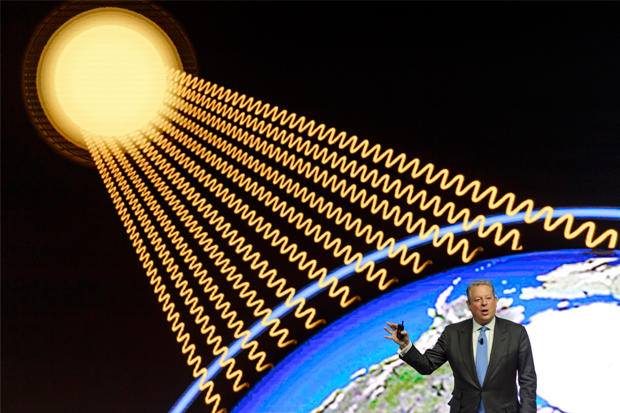In the wake of South Australia’s instant State-wide blackout on September 28, and the political storm that followed the physical one, it is pertinent to note (or to remind ourselves) of the politically convenient myth that there is a 97 per cent consensus of scientists who believe global warming is man-made or mostly man-made… or partly man-made.
Fake statistics have been invoked to maintain the charade; the constantly regurgitated and misleading claim that 97 per cent of the world’s scientists agree on human contribution to global warming is so fraudulent it should be classified a crime, like disturbing the peace. It has become the defensive shield for advocates of warming. Public policy and billions of taxpayers’ dollars are at stake, so it is encumbent on the Chief Scientist, the responsible Minister, or the PM, to expose the fraud. Or tell taxpayers their version of where this statistic comes from.
It comes from a poll performed in 2008 by Professor Peter Doran and then-graduate student Margaret R.K. Zimmerman at the University of Illinois, Chicago.
The ‘survey’ was a two-question, online questionnaire sent to 10,257 earth scientists, of whom 3,146 responded. (Hundreds of scientists complained that the poll was fundamentally flawed and could be easily misinterpreted. Some said they could not complete the poll because of the mistakes.)
The two (unscientifically framed) questions:
- Do you think human activity is a significant contributing factor in changing mean global temperatures?
(The possible answers were, ‘Yes’, ‘No’, and ‘I’m not sure’.)
- What makes you unsure if human activity is a significant contributing factor in changing global mean temperatures?
Some typical responses:
‘I do not know what you mean by significant. I believe humans are affecting the climate, I am not sure how and to what level.’
‘What is meant by significant? A major contribution, yes, but what is human activity compared with increased solar activity. So far, it is lost in the statistical models.’
‘I cannot evaluate unquantified, qualitative statements like “major”, “important”, or “significant” and disapprove of their use in scientific discussions/conclusions.’
Of the responding scientists, 96.2 per cent came from North America. The researchers then selected 77 of their sample and declared them ‘experts’.
Of those, 75 mostly Californian scientists or 97.4, per cent, were found to agree with the proposition and this formed ‘the consensus’. That’s where the 97 per cent comes from.
The statistic was so easy to propagate, it spread like a virus and became a touchstone for the politics of the entire climate industry, an industry which has become a false-faith-driven commercialised cult, which, like Scientology, demonises non-believers and apostates. For many, even those who are not ideologically attached, it is well worth believing.
The latest Douglas-Westwood World Offshore Wind Market Forecast provides a ten-year view of the sector through to 2025. Cumulative offshore wind capacity is forecast to reach 74GW, driven by a large number of developments taking place in the UK, Germany and China and strengthened by the growth of new entrants to the offshore wind sector, such as France and the USA.
The headline on the Douglas-Westwood site says it all:
‘Rush to install offshore wind as 2020 Euro target looms. €200bn of Capital Expenditure will result in installed capacity >70GW by 2025’. That is approximately USD220bn and this is only offshore wind turbine production. How many villages in the poorest regions of the world could be connected to electricity and clean water for that outlay over nine years? Instead, wind turbines will be manufactured for offsore placement and an uncertain energy return, each resulting – ironically enough – in the emission of over 240 tons of CO2.
Douglas-Westwood also provides within its report a ‘Helicopter forecast – assessment of demand for construction and operations and maintenance (O&M) support, as a result of increased helicopter use as wind farms are installed far from shore.’ And there is much more in their extensive report, which is yours for between £3,650 and £ 4,650, depending on how many will access it. So they, too, are beneficiaries of the global climate industry, commercially exploiting the politically enforced belief in global warming and the urgent need for renewable energy to replace fossil fuels.
Siemens is the biggest in this business and accounted for all of 2015’s new offshore capacity, but only 1.7 per cent of the onshore market. Wind businesses are generating solid revenue from the commercialisation of the ‘consensus’ just as the scientists, the bureacucrats and all their teams who are on the climate payroll around the world.
On the way from Vienna to Budapest by train at the end of September, chomping on a sausage and sipping a beer in the buffet car as we approached the border, we passed through a large windfarm, spread out on both sides of the railway line. The huge turbines stood listlessly in the breeze, a testament to feel good policies. Wind farms produced 9 per cent of Austria’s electricity generation in 2015, according to Osterreich’s Energie.
There is money in solar, too, of course. In the first quarter of 2016, solar installations in the US totalled 1 million, according to the Solar Energies Industries Association, which is very bullish about prospects. To put it in context: Today, solar energy provides five-tenths of 1 per cent of the total energy consumed in the United States, according to the Institute of Energy Research.
With the Paris COP21 undertakings becoming effective from November 2016, the developed world is poised to increase its spending on emissions reduction at the cost of many billions of dollars. The cash beneficiaries are unlikely to surrender the ideological battle for global warming, even though the globe ain’t warming no more – and humans were not the cause to start with. If we were, those scientists gripped by their belief would have arrived at a consensus as to what percentage of the 1.4 per cent of the atmosphere is man- made carbon dioxide.
The post The Big Con appeared first on The Spectator.
Got something to add? Join the discussion and comment below.
Get 10 issues for just $10
Subscribe to The Spectator Australia today for the next 10 magazine issues, plus full online access, for just $10.
You might disagree with half of it, but you’ll enjoy reading all of it. Try your first month for free, then just $2 a week for the remainder of your first year.














Comments
Don't miss out
Join the conversation with other Spectator Australia readers. Subscribe to leave a comment.
SUBSCRIBEAlready a subscriber? Log in